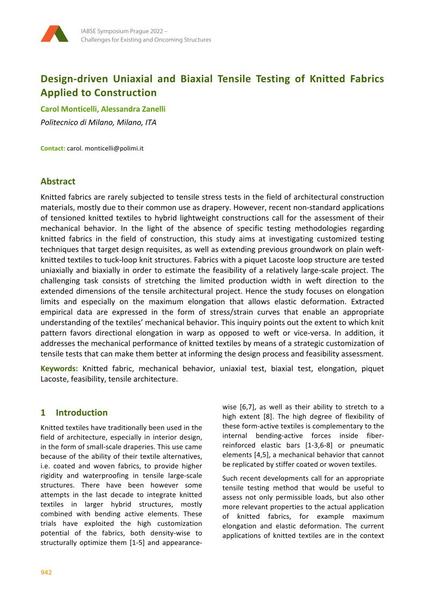Design-driven Uniaxial and Biaxial Tensile Testing of Knitted Fabrics Applied to Construction

|
|
|||||||||||
Bibliographic Details
| Author(s): |
Carol Monticelli
(Politecnico di Milano, Milano, ITA)
Alessandra Zanelli (Politecnico di Milano, Milano, ITA) |
||||
|---|---|---|---|---|---|
| Medium: | conference paper | ||||
| Language(s): | English | ||||
| Conference: | IABSE Symposium: Challenges for Existing and Oncoming Structures, Prague, Czech Republic, 25-27 May 2022 | ||||
| Published in: | IABSE Symposium Prague 2022 | ||||
|
|||||
| Page(s): | 942-955 | ||||
| Total no. of pages: | 14 | ||||
| DOI: | 10.2749/prague.2022.0942 | ||||
| Abstract: |
Knitted fabrics are rarely subjected to tensile stress tests in the field of architectural construction materials, mostly due to their common use as drapery. However, recent non-standard applications of tensioned knitted textiles to hybrid lightweight constructions call for the assessment of their mechanical behavior. In the light of the absence of specific testing methodologies regarding knitted fabrics in the field of construction, this study aims at investigating customized testing techniques that target design requisites, as well as extending previous groundwork on plain weft- knitted textiles to tuck-loop knit structures. Fabrics with a piquet Lacoste loop structure are tested uniaxially and biaxially in order to estimate the feasibility of a relatively large-scale project. The challenging task consists of stretching the limited production width in weft direction to the extended dimensions of the tensile architectural project. Hence the study focuses on elongation limits and especially on the maximum elongation that allows elastic deformation. Extracted empirical data are expressed in the form of stress/strain curves that enable an appropriate understanding of the textiles’ mechanical behavior. This inquiry points out the extent to which knit pattern favors directional elongation in warp as opposed to weft or vice-versa. In addition, it addresses the mechanical performance of knitted textiles by means of a strategic customization of tensile tests that can make them better at informing the design process and feasibility assessment. |
||||
| Keywords: |
elongation feasibility mechanical behavior Knitted fabric uniaxial test biaxial test piquet Lacoste tensile architecture
|
||||
| Copyright: | © 2022 International Association for Bridge and Structural Engineering (IABSE) | ||||
| License: | This creative work is copyrighted material and may not be used without explicit approval by the author and/or copyright owner. |
||||
